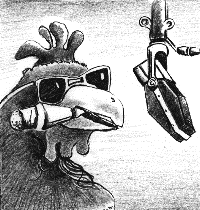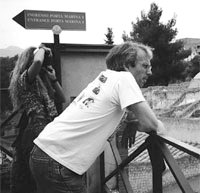

Rough Seas, No Land in Sight
George Myers wanted to throw a party. Not just any party, mind
you, but The World's Greatest Floating Blues Party. To
his everlasting credit, he pulled it off -- and not just
once, but seven times. The Ultimate Rhythm & Blues Cruise
brought the term "blues cruise" into common parlance
and provided a rollicking good time on the high seas for a growing
family -- which is exactly what they considered themselves
-- of enthusiastic cruisers, many of whom were what George
lovingly called "repeat offenders." Each cruise built
in scale upon the previous one: more bands, more people, more
exotic locations. From its original stomping grounds in the Caribbean,
the URBC expanded to the Mediterranean and was planning an excursion
to Greece this June when things began to unravel.
While the cruises were wildly successful as aesthetic experiences,
the company didn't always take in as much money as it shelled
out. It was embroiled in a legal dispute involving several hundred
thousand dollars with one of the cruise lines. In mid-May the
shoe finally fell. Just two weeks before the Greek tour, a letter
from Myers produced an alarming collective thud in the hearts
of prospective partiers. "It is with regret that I must
inform you that due to the adverse decision of a lawsuit and the
poor sales of URBC8 that Ultimate Rhythm & Blues Cruise Inc.
is insolvent. Consequently the cruise will not occur."
The news would get worse. From what was a business fiasco and
a major disappointment -- not to mention a possible financial
setback -- for the hundreds of blues fans whose excitement
was building for the trip to Greece, things took a tragic turn.
Word soon filtered out that, embarrassed and disheartened, George
Myers, 51, had taken his own life sometime on the morning of May
18.
· · ·
I had planned to be on board that Greek cruise and was crestfallen
when I learned that it had been canceled. But that was swept away
by this greater loss, and I'm here to praise George Myers,
not to bury him under the recriminations and legal actions that
seem likely to follow his passing.
I first met George at 1994's URBC3 in the Caribbean and
we became instant friends. He was a hyperkinetic individual who
poured his considerable zeal and energy into a love for the blues.
As an underage youth it had led him to hop planes from his home
in Kansas City to Chicago, where he would hang out all night listening
to music before catching a flight back and going to school the
next day. Later he would channel it into his award-winning nightclub,
the Grand Emporium, in which he (along with Roger Naber and Herb
Palmer) was a partner for 13 years.
"You see all those posters up there?" he once asked
me, pointing to the handbills proclaiming the various blues and
jazz greats who have played at the club and which became its wallpaper.
"People think those are up there for the sake of the customers.
But I really want the musicians to see them so they'll
know what kind of standards they have to play up to."
George was passionate, adamant about the music. He'd been
around enough to know the good stuff when he heard it and wouldn't
be satisfied with less. "My ultimate blues set,"
 he told me, a glint in his eyes, "would be nine consecutive
Otis Rush songs, each more depressing than the last." Not
that he was in any way a somber person; it was just that down
sound that he loved, and I could completely relate.
he told me, a glint in his eyes, "would be nine consecutive
Otis Rush songs, each more depressing than the last." Not
that he was in any way a somber person; it was just that down
sound that he loved, and I could completely relate.
In addition to the club and the cruise biz, he also had a "straight
job" as a commodities broker, a profession that requires
a stomach for volatility and the ability to juggle a number of
balls at one time. "George was always unsettled --
he never was content. He always had to have all these things going
on and be in the center of the maelstrom," his friend and
fellow trader Dave Gibson told The Kansas City Star. "But
the music was always his avocation, the real constant for him.
Everything else was a momentary distraction."
Within the music business -- which certainly attracts its
number of flakes, phonies and crooks -- George was one of
the good guys, a responsible, "do it the right way"
guy. On the cruise ships there couldn't be just one
stage for the music, and your average shipboard sound system just
wouldn't do the trick. And if we're going to go
to Greece, wouldn't it be fun to have all the loonies aboard
a chartered flight, even if it's maybe not the most economical
way to do it?
At the end, with the situation spiraling out of control, he couldn't
abide the fact that he'd let a lot of people down. But
he also didn't comprehend or accept that those of us who
knew him would love him anyway.
In his letter to the cruise customers, George apologized and took
personal responsibility for concealing the extent of the company's
financial problems from employees and stockholders. Clearly, he
didn't think that was sufficient. "This was the
most honorable way to settle his accounts," said long-time
friend and partner Naber. "It was his way of apologizing."
"He owed more than he had, and he knew this trip would
only make it worse," said Marcia Selko, president of the
Baltimore Blues Society and one of those blues cruise recidivists.
"It was his goodness that caused this, not anyone's
meanness. He simply tried too hard."
Blues from the Red Rooster Lounge originates on Boulder's
KBCO 97.3 FM (where it can be heard Sundays at 9 p.m.) and airs
weekly on 15 radio stations around the U.S.. Check with your local
station for availability. (Station program directors can receive
a sample copy of the program by calling the Longhorn Radio Network
at 1-800-457-6576.) The Rooster also consults for the MusicChoice
digital cable radio service, a 24-hour commercial-free, all-blues
channel available from hundreds of cable providers nationwide.
This page and all contents are © 1998 by Blues Access, Boulder, CO, USA.
|